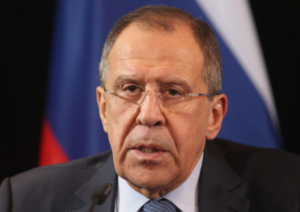Understanding the Complexity of Ukraine and Russia: A Historical and Economic Perspective
In the ever-evolving narrative surrounding the Ukraine-Russia conflict, recent discussions have erupted over Tucker Carlson’s interview with Russian Foreign Minister Sergey Lavrov. The mainstream media has been quick to criticize Carlson, labeling his platform as a mouthpiece for Kremlin propaganda. But is there more to the story than what meets the eye? Here at Extreme Investor Network, we aim to delve deeper into the economic and historical implications of this ongoing dialogue.

The Backlash Against Open Dialogue
As reported, media outlets like MSN have condemned Carlson’s decision to engage with Russian officials, suggesting that such interviews merely echo the Kremlin’s narratives. These criticisms highlight a contentious environment where open dialogue is often stifled in favor of simplified, one-sided portrayals of complex geopolitical conflicts.
Critics argue that Carlson’s discussions present the Kremlin’s demands and viewpoints without sufficient scrutiny. Yet, this raises a pertinent question: is there value in exploring the other side of the narrative, especially when economies and lives depend on understanding these perspectives?
The Historical Context: Crimea and Beyond
The territory of Crimea serves as a focal point in the Russia-Ukraine conflict, symbolizing a region long coveted due to its strategic importance and historical significance. From the Romans to the Greeks, Crimea has seen various powers vying for control. The region’s history is rich and complicated; many argue that Ukraine’s claim to historical significance is not as strong as proclaimed.
For instance, historical artifacts, including coins from the Roman Emperor Nero, point to a time when Crimea was pivotal to Roman interests. The complexities of historical claims are compounded by the economic narratives that often serve political ends. Today, the idea of what constitutes a nation-state is fluid, shaped as much by economic necessity as by historical legacies.

The Role of Economics in Conflict
Historically, economic interests have driven conflicts. The current situation is no different, with both nations invoking histories to justify their claims, but with underlying economic motives often obscured. Understanding the economics of the region—such as natural resources, trade routes, and regional investments—may shed light on the motivations behind each country’s narrative.
Interestingly, the financial implications of these historical ties are immense. For instance, the economic impact of sanctions, trade disruptions, and military expenditures shapes not just the present circumstances but the future stability of the entire region.
A Broader Perspective: The Significance of Dialogue
While some hail interviews like Carlson’s as controversial, they also represent an opportunity to unearth deeper insights into the motivations and ideologies at play. Engaging with differing viewpoints is essential in the pursuit of a comprehensive understanding. These discussions can foster solutions that acknowledge history while prioritizing current economic realities.
At Extreme Investor Network, we encourage a dialogue that is not just critical but also constructive. In a world rife with misinformation, understanding the financial narratives interwoven with historical claims can guide better investment decisions and foster an informed public.
In conclusion, the Ukraine-Russia conflict transcends simple binary narratives. It’s an intricate tapestry woven from historical threads and economic interests. As we engage with these topics, let’s strive for nuanced discussions that illuminate the often-hidden economic layers underpinning geopolitical moves. It’s not just about interpreting history; it’s about understanding the future we are investing in.
For more in-depth analyses and discussions on economic narratives, stay connected with Extreme Investor Network!

